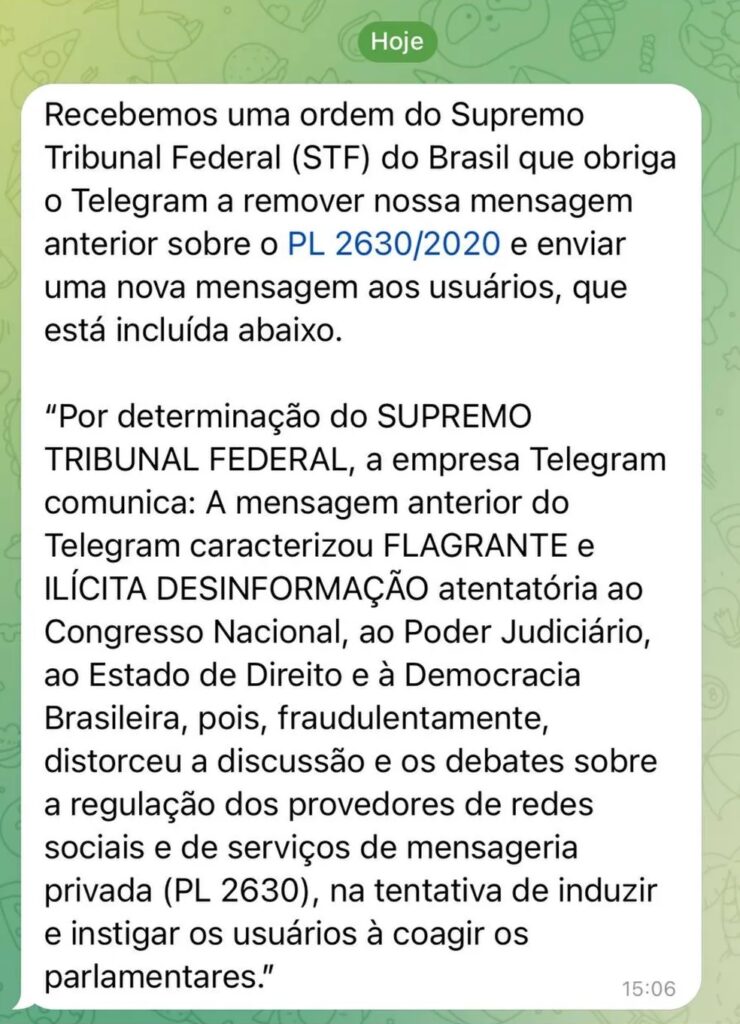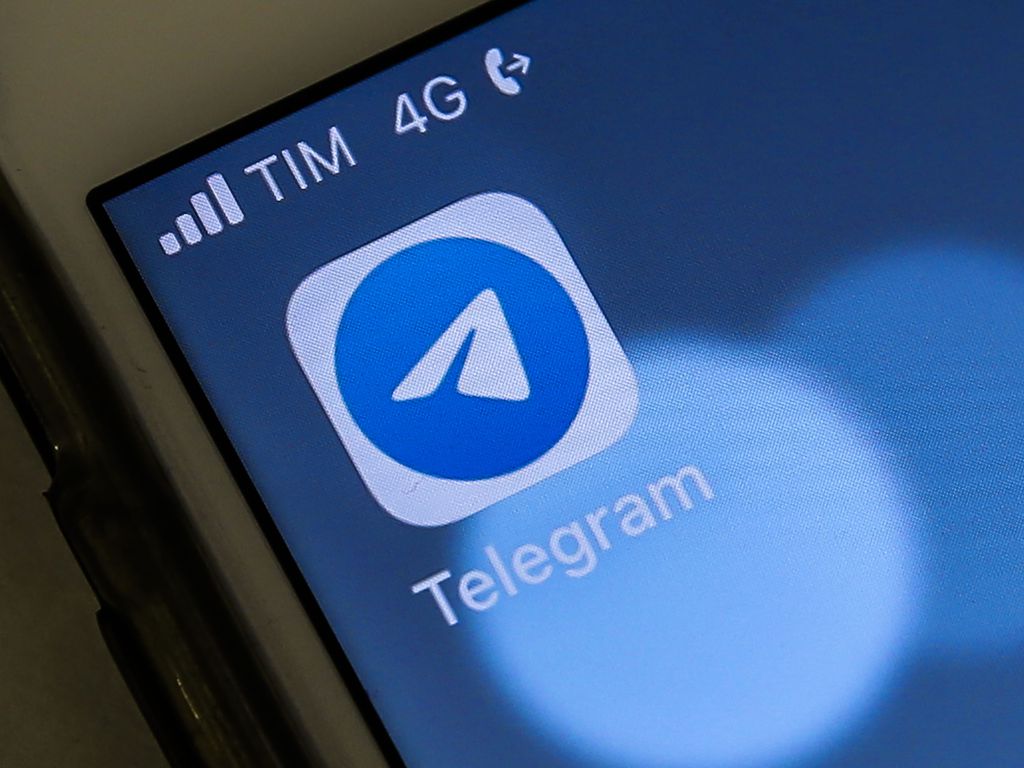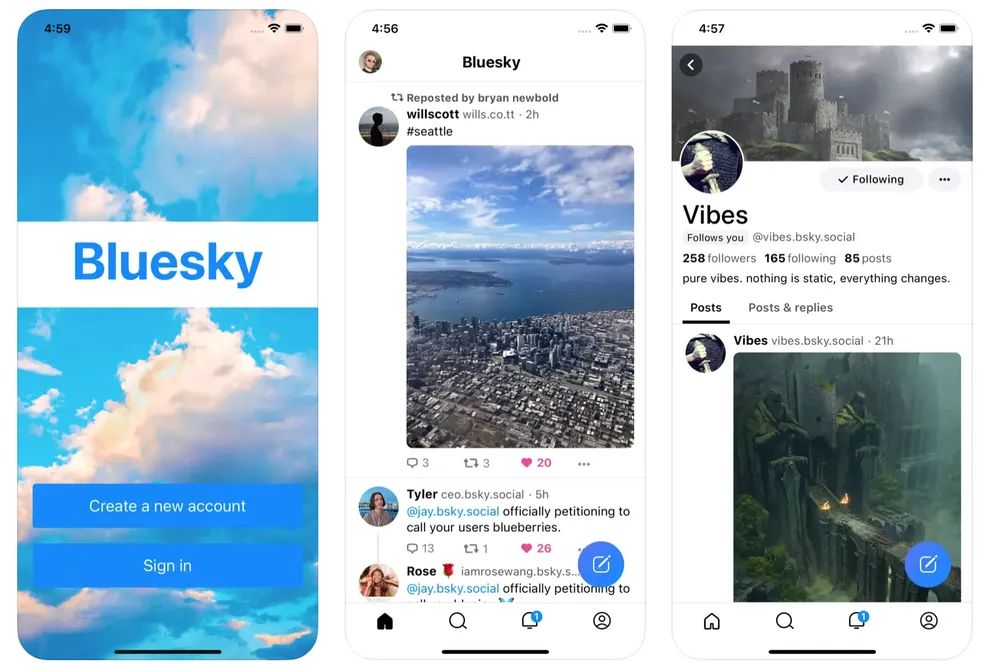São Paulo, Brazil – To avoid being blocked in Brazil for at least 72 hours, Telegram complied with a Supreme Court order and deleted a message it sent on Tuesday to thousands of users in the country which slammed a bill that intends to regulate social media, Brazil’s so-called “fake news bill.”
In the message, Telegram said that the proposed bill “would put an end to freedom of speech in Brazil” and asked users to pressure deputies to vote against it. The text is being discussed in the Chamber of Deputies, but after being postponed last week, there is still no new date for voting.
“Brazil is about to pass a law that will end freedom of speech. The bill gives the government censorship powers without prior judicial oversight. For fundamental human rights, this bill is one of the most dangerous ever considered in Brazil,” read part of the Telegram message.

The message led to immediate reactions from politicians who favor the bill, the federal government, the Public Prosecutor’s Office and the Supreme Court. The rapporteur for the proposal in the Chamber of Deputies, deputy Orlando Silva, called the platform’s action “unacceptable” and said that the statement that Brazil “will end freedom of speech” is a lie.
The Minister of Justice already notified Telegram and gave it two days to clarify the incident, under penalty of a fine or suspension of its activities in the country.
“The government notified the platform, because we understand that the debate must be balanced. All voices, in favor or against the bill, must be heard on equal terms,” said the ministry.
According to Minister of Justice Flávio Dino, the platform’s message was nothing more than “several absurdities” against Brazilian institutions.
The Public Prosecutor’s Office opened an initial investigation and asked for clarification from the company, questioning, for example, whether Telegram has a channel for contestation by users who disagree with its positioning.
On Wednesday, Supreme Court Justice Alexandre de Moraes ordered Telegram to delete the message, under penalty of suspension of the app for 72 hours and a fine of R$500,000 (USD $100,000) per hour. About an hour after the order, Telegram deleted the message.
“Telegram’s conduct constitutes, in theory, not only an abuse of economic power near the bill’s vote, for trying to illegally and immorally impact public opinion and the vote of deputies, but also a flagrant inducement and instigation to maintain many criminal conducts practiced by digital militias,” said the judge.
Moraes also ordered the platform to send a new message to users stating that the original publication constituted “flagrant and illicit misinformation” for having said that the approval of the law could be understood as censorship.

In addition, company representatives in Brazil must provide clarification to the Federal Police within 48 hours, also by order of the Supreme Court.
On Twitter, the Justice Minister praised Moraes’ order and said that it is an important step towards “setting regulatory guidelines for these companies.”
“The digital Wild West is incompatible with the Constitution,” said Dino.
Government vs big techs
Telegram was not the first platform to publicly speak out against the “fake news bill.” Last week, Google published a message on its homepage in Brazil stating, “The fake news project may increase confusion about what is true or false in Brazil.”
A link in the message led to a blog post by Google criticizing the project, highlighting potential censorship and a worsening of the internet experience in Brazil if the bill is approved.

The government reacted and, through the Ministry of Justice, ordered Google to mark the message as an advertisement, and said the company would be fined R$ 1 million (USD $200,000) if they did not comply. Google ended up removing the link from its homepage.
Read more: Brazil pressures big tech amid social media regulation debates in Congress
Other companies, such as Spotify and Meta, which owns Facebook, WhatsApp and Instagram, are also being investigated for allegedly disseminating advertisements contrary to the “fake news bill” without indicating that they were, in fact, advertising content.
While the proposed bill awaits a vote in congress, the administration of President Luiz Inácio Lula da Silva, which supports the bill, is having a row with big tech companies. According to Minister Dino, the government found evidence that some big techs were trying to manipulate the public debate to defend their own economic interests.
“We hope that platforms deactivate mechanisms of censorship or violation of freedom of speech with isonomy. And we remain open to dialogue. The law must prevail over a digital Wild West,” wrote the minister on Twitter.
The “fake news bill” affirms that social media, messaging apps and search platforms must act to withdraw or reduce the reach of accounts and publications accused of spreading criminal content, such as the encouragement of coups, acts of terrorism, suicide, crimes against children and teenagers, discrimination and prejudice, violence against women and health violations.
It comes on the heels of the January 8 attacks on government offices by supporters of former President Jair Bolsonaro as well as a series of violent episodes in schools across the country.










